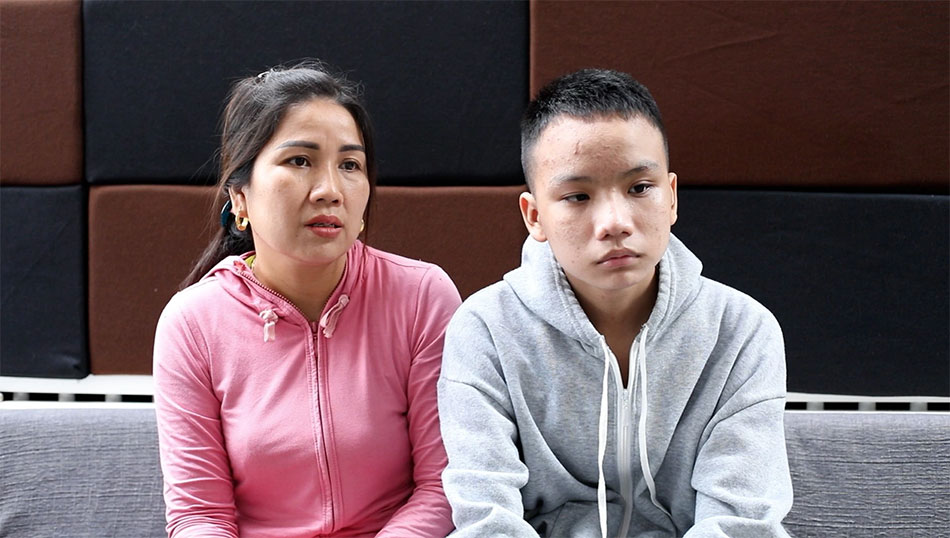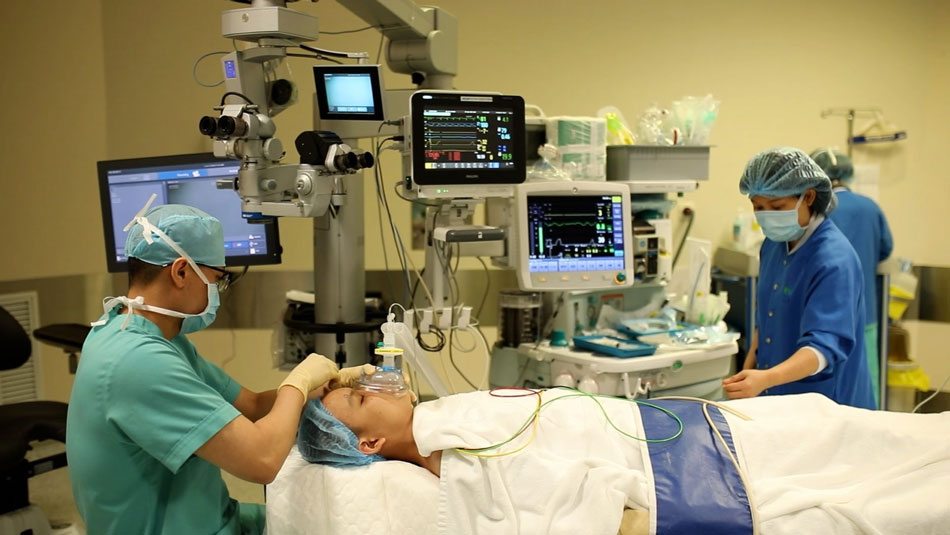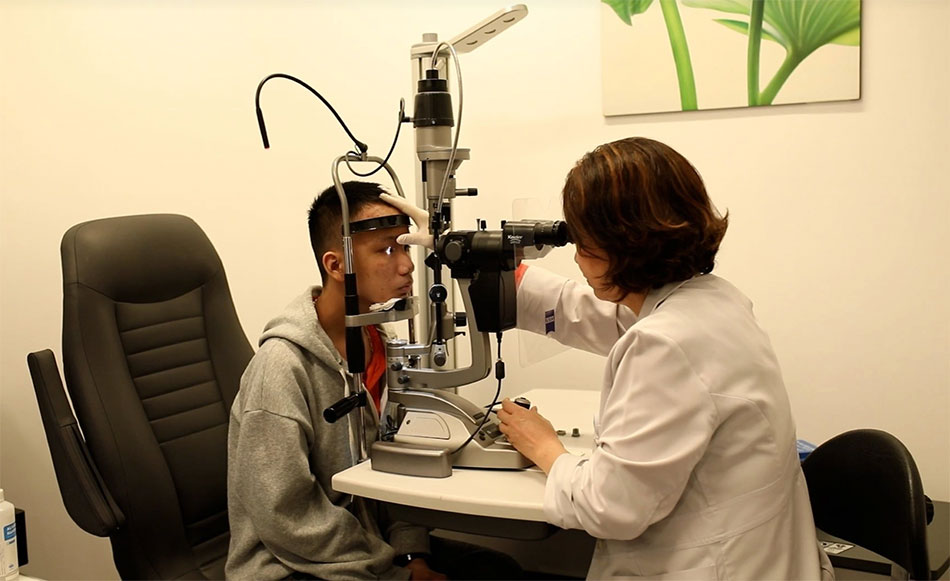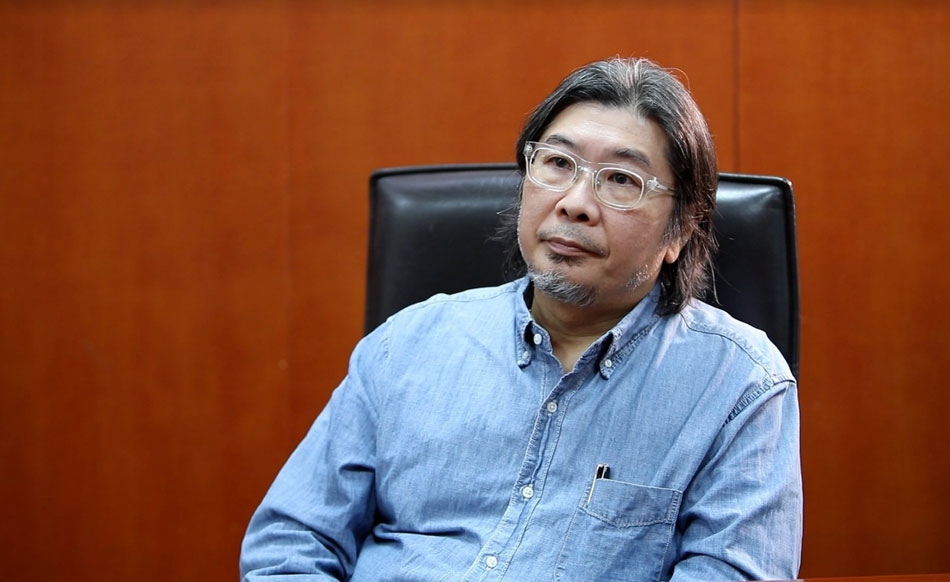Dang Huu Toan had a severe case of conical cornea and thought he would have to stop studying and postpone his future because he could no longer see. A transplant carried out promptly by the world’s leading cornea expert, Prof. Donald Tan, FV Hospital restored his vision, along with the opportunity to lead a normal life.
The fear of living in the dark forever
In the middle of 2021, Dang Huu Toan (15 years old, Dak Lak) noticed that his eyesight was fading, and it was increasingly difficult for him to read words. At first, his mother Dong Thi Lanh thought that her child was short-sighted as a result of studying online for many hours at the computer. She took her son to a local eye centre where the doctor diagnosed Toan with Keratoconus disease.

Dang Huu Toan and his mother share their journey to find the light
Keratoconus is a condition in which the cornea is not spherical but bulges outward into a cone shape. The cone can cause blurred vision and make the patient sensitive to light. In severe cases this condition can lead to permanent blindness.
“When I was informed of my child’s condition, I fell to my knees while standing at the doctor’s desk. I was depressed and unable to sleep for two days because I blamed myself for being careless and lacking the knowledge about what lead to my child’s condition,” says Lanh.
After receiving this harrowing diagnosis, Lanh brought Toan to a major eye hospital in Ho Chi Minh City for treatment. Toan then underwent crosslinking surgery, during which vitamin B2 and irradiated ultraviolet light was administered to the cornea, to slow the progression of the apical cornea of the left eye. Toan’s right eye was so badly affected that only a corneal transplant could help, but the hospital did not have a source of corneas to perform a transplant.
Lanh did some research and she learned that the source of donated corneas in Vietnam is very limited. This made her more miserable, thinking about a future in which her child had to live in the dark.
“At that time, I just wanted to know where I could take my child to get a corneal transplant,” she said.
One of Lanh’s acquaintances recommended that she check out FV Hospital, which imports corneas from a donated cornea bank in the US and cooperates with Singaporean Prof. Donald Tan – former President of the World Corneal Society – on surgeries to implement corneal transplants for Vietnamese patients at FV. The programme, which started in 2016, has restored the vision of many patients, including those in difficult circumstances. Lanh immediately took her child to FV Hospital.
A miraculous recovery
Dr Nguyen Thi Mai, Head of Ophthalmology and Refractive Surgery, FV Hospital, says that when Toan visited the hospital his condition was already serious. His eyesight on the left side was around a one or two out of 10, and almost completely gone on the right side: Toan could only perceive light, not shapes. Huu Toan was recommended to undergo corneal transplant surgery for his right eye and to wear a contact lens to treat keratoconus in his left eye.

The corneal transplant surgery for Toan at FV hospital was successful
In May 2022, Toan’s surgery was one of seven corneal transplants byat FV Hospital after nearly three years of Covid-19-related interruptions to the programme.
Speaking about the case, Prof. Tan said that Toan’s cornea was so deeply damaged that an replacing the entire cornea was the only solution. If the issue had been detected earlier, only the front part of Toan’s cornea would have needed replacing, and the inner tissue layer could have been kept intact—a procedure known as lamellar keratoplasty.
“The main advantage of lamellar keratoplasty is a significant decrease of the risk of corneal transplant rejection from 10 to 15 per cent, typical of penetrating keratoplasty, to only one to two per cent. Fortunately, the patient responded well,” he said.

Dr Nguyen Thi Mai, Head of Ophthalmology and Refractive Surgery, FV Hospital, checks Toan’s eyesight.
Upon examination five months after surgery, Toan’s eyesight had recovered well. His eyesight in the left eye had been restored to 10/10 when wearing a contact lens to counteract his conical cornea. His sight on the right side had improved from almost zero to 8/10 after the corneal transplant. Dr Mai explains that Toan’s vision will continue to improve after the suture is removed in about six months’ time. After a year of absence from school, Toan was able to return to lessons and continue working on building the future of his dreams.
“I am so grateful to Prof. Donald Tan and Dr Nguyen Thi Mai, as well as the nurses of FV Hospital. Finally, my child has found the light again,” says Lanh.
An opportunity for Vietnamese patients to restore their vision
After many years of cooperation with FV Hospital, Prof. Donald Tan has found that corneal diseases in Vietnam are typically much more complicated than in Singapore.
He says that this because there is a high rate of congenital corneal diseases in Vietnam, yet they are often detected late. This is partly to do with the fact that patients are often unaware that they are at risk and wait until the disease is well developed before visiting an ophthalmologist for a check-up, and partly due to the limited professional capability of doctors and poor access to diagnostic and surgical equipment. Keratoconus can only be detected at an early stage with advanced machines which few hospitals and specialised clinics possess.

Prof. Donald Tan believes patients in Vietnam should choose FV Hospital as the place to receive corneal transplants
To restore the vision of more Vietnamese patients, for many years Prof. Tan has cooperated with FV Hospital to perform corneal transplants for patients sent by FV to Singapore. However, the cost of travel and a hospital stay in Singapore is high, and so Prof. Tan decided to fly to Vietnam to perform corneal transplants at FV Hospital to minimise costs for patients and enable more Vietnamese people to access care.
“I always choose my source of corneas very carefully. Only corneas with fresh, healthy and transparent cells imported from major eye banks in the US and Singapore, the world’s leading place of processing and preserving donated corneas, are used for my transplant patients,” he explains. Prof. Tan says that the quality of the cornea is very important for the success of the transplant. If the cornea is of low quality, there is a risk that the operation will and the patient will never regain their eyesight.
Prof. Donald Tan also shares that FV hospital’s advanced international-standard facilities and equipment and team of skilled, well-trained doctors and nurses ensure that he feels confident in performing corneal transplants at FV.



